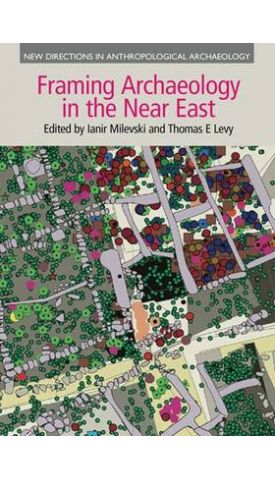אנו משתמשים ב-Cookies כדי לשפר את החוויה שלך. כדי לקיים ההנחיה החדשה של e-Privacy, עלינו לבקש את הסכמתך להגדיר את ה-Cookies. קבלת מידע נוסף.
מחיר מבצע
380.00 ₪
מחיר רגיל
542.00 ₪
FRAMING ARCHAEOLOGY IN THE NEAR EAST: THE APPLICATION OF SOCIAL THEORY TO FIELDWORK
מחיר מבצע
380.00 ₪
מחיר רגיל
542.00 ₪
ISBN13
9781781792476
יצא לאור ב
London
עמודים / Pages
156 13 figures
פורמט
Hardback
תאריך יציאה לאור
1 בספט׳ 2016
שם סדרה
New Directions in Anthropological Archaeology
This volume presents a series of studies by scholars working in Middle Eastern archaeology who actively apply social theory to interpret their fieldwork. It aims to highlight the value of using social theory in the interpretation of field work in a region where, traditionally, such approaches have not played a major role.
This volume presents a series of studies by scholars working in Middle Eastern archaeology who actively apply social theory to interpret their fieldwork. It aims to highlight the value of using social theory in the interpretation of field work in a region where, traditionally, such approaches have not played a major role.There are a number of factors that account for why social theory is often under-exploited by archaeologists in this part of the world. In many countries, where large numbers of the foreign archaeologists are involved, a division between those doing fieldwork and those undertaking archaeological interpretation can easily arise. Or, the lack of interest in social theory may stem from a legacy of positivism that overrides other approaches. There is also the fact that archaeology and anthropology often belong to separate academic departments and are considered two separate disciplines disconnected from each other. In some cases the centrality of historical paradigms has precluded the use of social theory.There are also divisions between universities and other research institutions, such as departments of antiquities, which is not conductive to interdisciplinary cooperation.
This factor is especially debilitating in contexts of rapid destruction of sites and the exponential growth of salvage excavations and emergency surveys.The papers integrate a wide range of perspectives including 'New' or 'Processual' archaeology, Marxist, 'Post-Processual', evolutionist, cognitive, symbolic, and Cyber- archaeologies and touch on many topics including 3D representation, GIS, mapping and social theory, semiotics and linguistics, gender and bioarchaeology, social and technical identities, and modern historical modellingy and social practices in Middle Eastern archaeology.
| עמודים / Pages | 156 13 figures |
|---|---|
| פורמט | Hardback |
| ISBN10 | 178179247X |
| יצא לאור ב | London |
| תאריך יציאה לאור | 1 בספט׳ 2016 |
| תוכן עניינים | Introduction: Social Theory and ArchaeologyIanir Milevski and Thomas E. LevyChapter 1: Spacetime Mapping the Ancient Near East: Scalability and Seamlessness in Theory and Practice of Spatial Archaeology. Michael Harrower, Johns Hopkins UniversityChapter 2: Gender and the Archaeology of the Ancient Near East: Femininities and Masculinities. Joanna Mardas, Institute of Prehistory, Adam Mickiewicz University Chapter 3: Perspectives on Sex and Gender Questions through Burial Practices in Southern Central Asia during the Bronze Age.Elise Luneau, Deutsches Archaologisches Institut Chapter 4: Semiotics in Action: Neolithic Imagery on the MovePatrycja Filipowicz, Institute of Prehistory, Adam Mickiewicz University Chapter 5: The Role of Communication in Late 3rd Millennium BC Mesopotamian Society Supported by Cross-disciplinary Interpretative ToolsAlessandro Di Ludovico, "La Sapienza" Universitadi RomaChapter 6: Social Theories, Technical Identities, Cultural Boundaries: a Perspective on the "Colonial Situation" in Late Chalcolithic 3-5 Northern MesopotamiaJohnny Samuele Baldi, Institut Francais du Proche-Orient Chapter 7: New Social Perspectives on Intermediate Bronze Age Burial Practices at JerichoAaron Greener, Bar-Ilan University Chapter 8: The Kingdom of Edom? A Critical Reappraisal of the Edomite State ModelJuan Manuel Tebes, Pontificia Universidad Catolica Argentina Chapter 9: Biblical Archaeology, Processualism, Post-Processualism and BeyondIanir Milevski and Bernardo Gandulla, Universidad de Buenos Aires |
| Author | Ianir Milevski |



Login and Registration Form